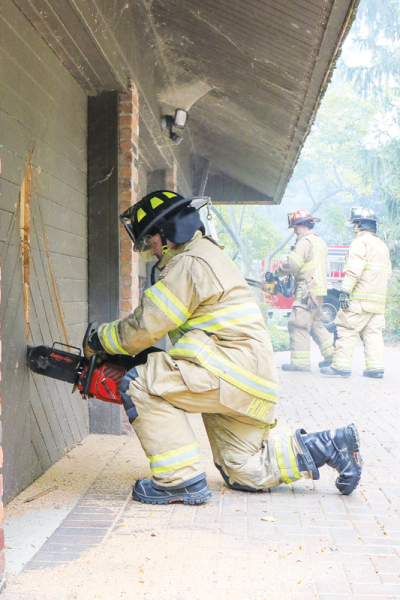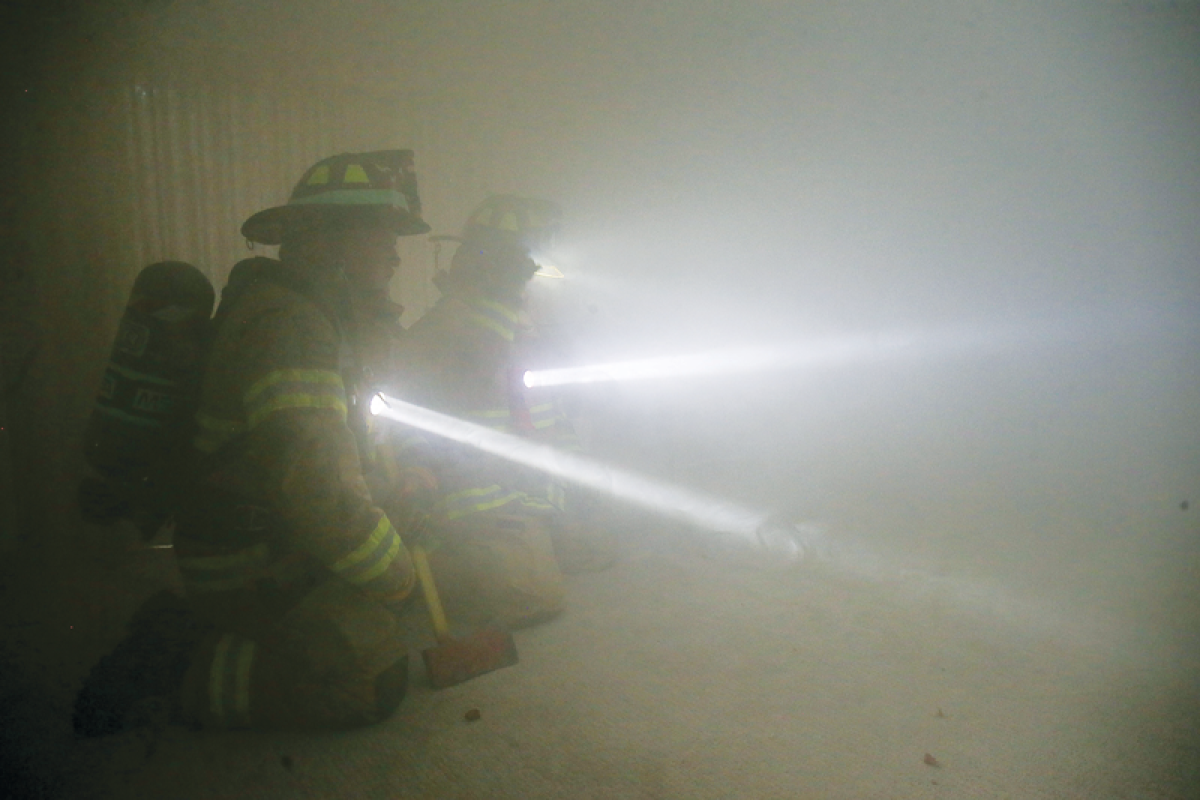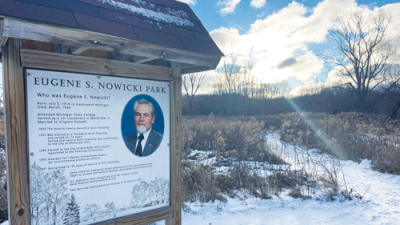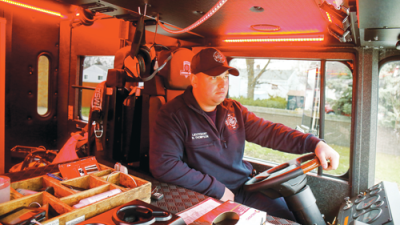
Grosse Pointe Shores public safety officer Billy Howe uses one of the department’s specialty tools as he tries to cut a hole in a garage door during a fire training exercise Sept. 26 at a home in the 800 block of Lake Shore Road slated for demolition.
Photo by Patricia O’Blenes
GROSSE POINTE SHORES — The dense, nontoxic white fog filling a room in a Grosse Pointe Shores house on Lake Shore Road isn’t actual smoke, but for fire training, it’s a good substitute because, like the real thing, it’s completely blinding. Stick your hand in it and it vanishes.
Relying on what they learned in the fire academy and from fighting previous fires, three Grosse Pointe Shores Public Safety officers crawl into the room as a team, hanging onto one another as they carefully make their way through an unfamiliar space in an effort to find and rescue anyone who might be trapped in the home. On this Thursday morning, Sept. 26, Public Safety Director Kenneth Werenski said officers are responding to a scenario involving a smoke-filled home where they’re looking for two missing individuals.
“You can’t see anything,” Werenski said. “At the end of the day, you and your partner have to work together.”
As part of this exercise, officers enter the room on their hands and knees because this is something they’d likely need to do if responding to a similar scene.
“In a real fire, the flames would be coming up above us across the ceiling,” Lt. Tony Spina said, pointing up.
Werenski said the officers follow a specific search pattern in fires.
“It’s very organized when you go into these scenarios … so when you go in, you know how to get out,” Werenski said.
This exercise is a good opportunity for officers to use their thermal imaging cameras, which detect the heat signatures of humans and pets, enabling officers to more quickly locate and safely extricate any humans or animals who might be trapped.
If there’s ever a time to make mistakes, this is it.
“The last thing we want is for someone to get injured on a training exercise, so if we see an issue, we stop and correct it,” Spina said. “That’s part of training.”
This particular property was purchased by Matt and Karen Cullen, who offered up the home to the department for training because they plan to build a new house there. The department is grateful to the couple for allowing them to use the house and garage before it’s demolished.
“There’s no way we can possibly know the interior layout of every home in the village,” Spina said. “This is the most realistic, safe environment we can put officers into.”
Werenski has trained in multiple homes over the course of his three-decade career in the Shores, and said the experience is invaluable.
“If every two years we can get into a house and simulate these scenarios, it’s huge for us,” Werenski said. “We have to be good at fighting house fires. … This is what’s going to make us really good at it.”
Small and almost exclusively residential, the Shores doesn’t have many fires. Because the city has a mutual aid pact with the other Grosse Pointes and Harper Woods, officers get additional experience battling blazes in neighboring communities.
But, Shores firefighting poses unique challenges. For example, Werenski said the home where they were doing this training had a cedar shake roof — something he said can be found in at least a dozen other homes in the Shores, as well as other Pointes. While conducting a training exercise to ventilate the garage roof Sept. 24, Werenski said officers found that these roofs have thicker wood and more shingles, making them harder to cut.
“We’re learning what tools work best (on this kind of roof) so we’re not learning that in the heat of the moment,” Werenski said.
He said they also discovered that cedar shake roofs are extremely slippery when wet, meaning that officers need to take additional precautions to avoid falling.
Spina said officers would also be training at the home using fire extinguishers. If a fire is small enough — as is sometimes the case in kitchens — it can often be snuffed out that way, which is preferable to using water because it’s easier to clean up and leaves far less damage and debris.
Spina said officers visit schools to teach students how to use fire extinguishers at home, where the kids learn the “PASS” acronym — which stands for pull the pin on the extinguisher, aim the nozzle or hose, squeeze the handle and spray the extinguisher in a sweeping movement, side to side. He said extinguishers are good for putting out small fires caused by cooking oils, chemicals or combustible materials. Spina said they recommend that everyone have at least one fire extinguisher on each floor of the house, as well as the garage. They’re relatively inexpensive and can be purchased at hardware stores, many big box stores like Target and Costco, and some grocery stores. Spina said extinguishers don’t last forever, so homeowners will likely need to replace them every couple of years, but Shores officers can come to homes in the city and inspect them to make sure they’re working properly.
Also crucial are working smoke detectors. Spina said even if a home’s smoke detectors are connected to the electrical system, batteries remain essential because they wouldn’t be operational during a power outage, which is also when a downed power line could easily spark a blaze. Shores residents who cannot change their smoke detector batteries due to age or physical challenges can call the Public Safety Department and arrange a time for an officer to come to their home and do it for them.
 Publication select ▼
Publication select ▼


















